Ourebia ourebi
The long-legged oribi (oorbietjie in Afrikaans) is a small antelope, and one of the most special wildlife sightings you could hope for in South Africa.
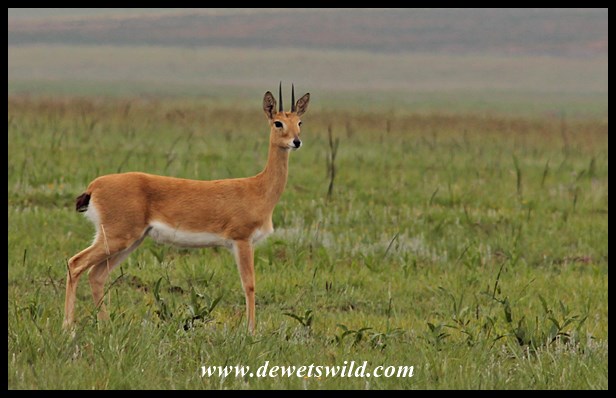
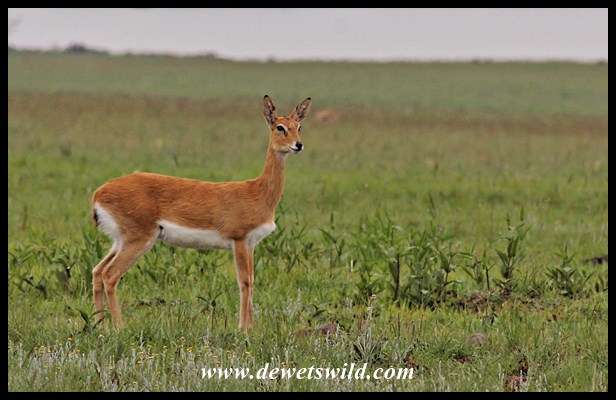
They stand only between 50 and 65cm high at the shoulder, and weigh around 14kg. Only the males carry the sharp little horns that average between 10 and 13cm long.
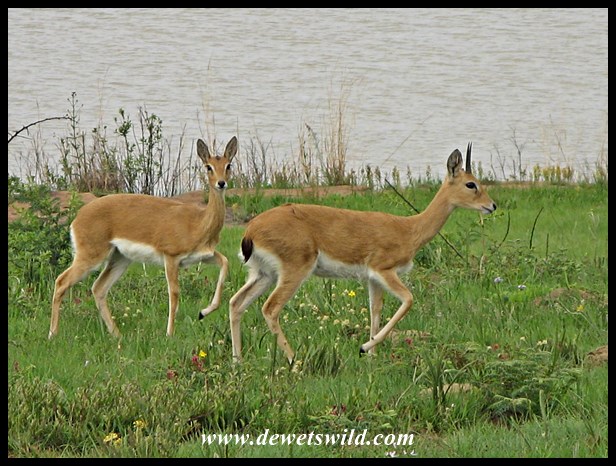
These dainty antelope have very specific habitat requirements, preferring grasslands and floodplains with just the correct mix of short (for grazing) and long (for hiding) patches of grass. They also have very specific preferences as to the type of short grasses they feed on and, while they often occur near water, do not appear to drink very regularly, if at all.
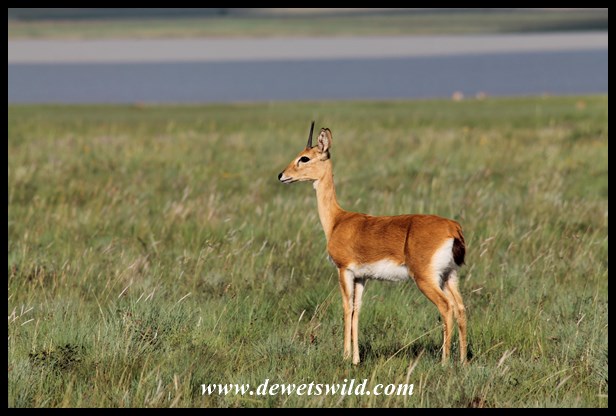
Oribis are the most social of the smaller antelope species; the most commonly encountered grouping being a single territorial ram with up to four adult ewes and their lambs.
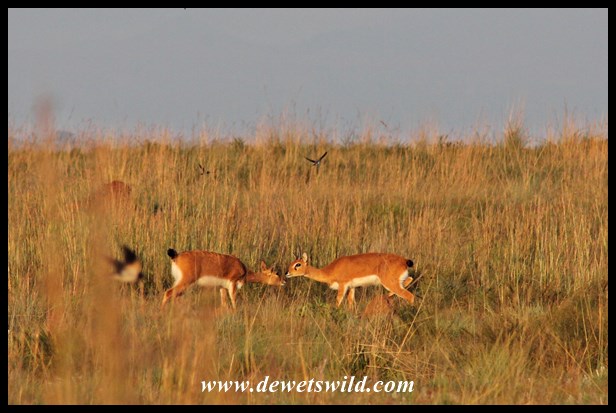

Oribi grazing next to the Kamberg Road
Oribi rams are territorial, and the family groups are extremely reluctant to leave their home ranges, even when being pursued (they prefer sprinting short distances to hide in long grass). For this reason, they suffer more than most dwarf antelope from predation and poaching. In South Africa, most lambs are born in the summer months of November and December and remain hidden for up to 4 months before they join their mother’s family group. They have a natural lifespan of 8 to 13 years.
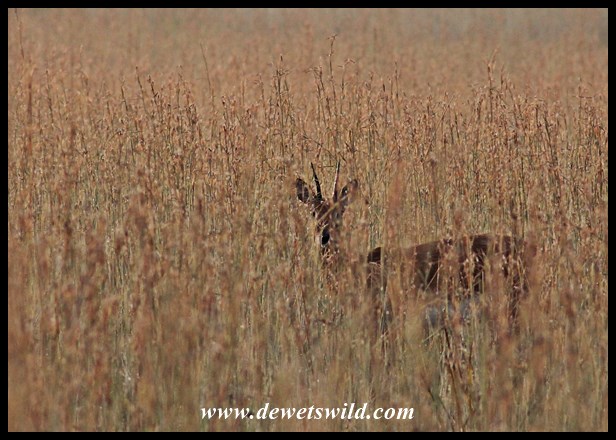
Today, the oribi is one of South Africa’s most endangered mammals, although in many other parts of Africa they are still quite numerous. Their favoured grassland habitat is prime for farming and thus getting ever scarcer and more fragmented, while illegal hunting with dogs is a further risk to their continued survival. Nevertheless, a substantial portion of the population still occurs on private land, and the Oribi Working Group’s annual census is an important tool to establish population sizes and trends.
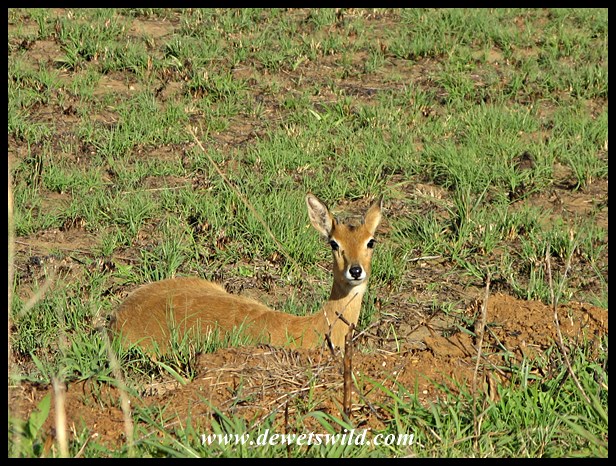
South Africa’s biggest single population of oribi occurs in the Chelmsford Nature Reserve in Kwazulu-Natal Province. Chelmsford was the first destination on our recent summer holidays in the bush, and we’ll soon share more about our latest visit there with you.
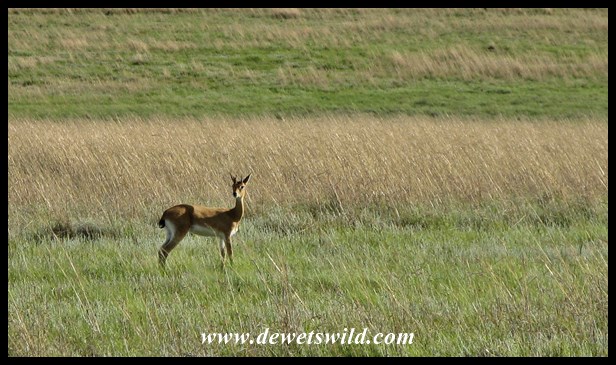


Pingback: Exploring Golden Gate | de Wets Wild
I like coming back to read different posts… weer eens ‘n lekker lees!! 😉
LikeLiked by 1 person
Altyd lekker as jy by ons kom kuier, AJ!
LikeLike
Pingback: Kgaswane Mountain Reserve | de Wets Wild
Pingback: Loskop Dam Nature Reserve | de Wets Wild
How sad that we as humans continue to encroach on the animals natural habitats. We have similar problems in Florida with the Florida panther as more and more of their wide ranging habitat is being developed for housing. Lovely post again Dries. Magical to see these small antelope. Both Marks and I have only seen them on National Geographic documentaries.
LikeLike
Us humans will likely only learn our lesson when it is too late… Thanks for more kind words, Joey!
LikeLiked by 1 person
Pingback: Summer at Chelmsford | de Wets Wild
Great shots, what a cutie!
LikeLiked by 1 person
Thank you very much, Michael!
LikeLike
They look so delicate!
LikeLiked by 1 person
And they are Jude, they don’t do well under stress at all. Thanks for visiting with us again!
LikeLike
BEAUTIFUL little animals, Dries ! – and those horns look like they could do a fair bit of damage if applied to another flank … Presumably they are poached for eating ? 😦
LikeLike
I’m sure the rams can put those sharp little horns to good use in self-defence and territorial fights, M-R! Sadly, while the poaching used to be for the pot, it’s seemingly now more about the “sport” of hunting with dogs, and betting which dog makes the kill first.
LikeLike
Give me strength … How utterly obscene.
LikeLike
Indeed, the depths humans can sink to…
LikeLike
Nice shots of these pretty bokkies – especially the male in the tall grass cover!
LikeLiked by 1 person
Thank you Maurice!
LikeLike
the most dreaded words: ‘most endangered.’ Why can’t the animals just live in peace. These are really beautiful creatures.
LikeLiked by 1 person
That’s a question we often find ourselves asking Lois. We take heart from the fact that at least their endangered status was recognised before it was too late and that places have been set aside where their survival can be ensured.
LikeLike
that is good to hear. Thanks so much,
LikeLike
So delicate !
LikeLiked by 1 person
Delicate they definitely are Kathryn, and deserving of protection. Thanks for visiting!
LikeLike
You know I cannot stay away!
LikeLiked by 1 person
Such beautiful animals. I hope they will be around forever.
LikeLiked by 1 person
They certainly deserve to be Hien, if only humans could learn that we have to share this planet…
LikeLike
So pretty, and thanks for the interesting info about them.
LikeLiked by 1 person
Thank you for appreciating our rare little oribis with us Maamej!
LikeLiked by 1 person
Dis nou ‘n bokkie wat ek graag wil sien.Dankie vir die interessante vertelling en pragfoto’s!
LikeLiked by 1 person
Baie dankie vir die gawe kommentaar Dina! As julle julself ooit in Newcastle se omgewing bevind, gaan maak n draai by Chelmsford Natuurreservaat vir n paar oorbietjie-fotos.
LikeLiked by 1 person
You guys have made so much effort to protect these animals. Thank you for the story!
LikeLiked by 1 person
Thank you Amy! We so enjoy sharing our love for our natural heritage with like-minded people like you 😀
LikeLike
You teach us to appreciate nature and respect animals. I feel so luck to find your blog. 🙂
LikeLiked by 1 person
We’re thankful that you did, and that you’ve supported us ever since Amy
LikeLiked by 1 person
🙂
LikeLike
Aaag, pragtig! Vernaam die foto met die lang horingkies. Uitsonderlike bokkies met interessante feite.
LikeLiked by 1 person
Hulle is regtig baie interessante bokkies, mens kan hulle ure lank dophou (as hulle jou net wil toelaat om dit te doen!)
LikeLiked by 1 person
What a beautiful animal.
LikeLiked by 1 person
A rare treat to behold, Maralee.
LikeLike
Yeah, learned more things today! Thank you! (I think they should hide better. I see them clearly… or it was because you have a great camera?) 😉 Helen
LikeLiked by 1 person
They made us work very hard for the clear photos Helen 😉
Thanks for another kind contribution to our blog!
LikeLiked by 1 person
What a darling creature! I am so happy to hear that there are some measures in place to protect this animal in South Africa. Your photos, as usual, are wonderful. (I’m wondering if Words With Friends will accept “oribi” as a word….) Thank you!!
LikeLiked by 1 person
Thank you Barbara! The name seems to fit the little antelope so well, doesn’t it?
LikeLike